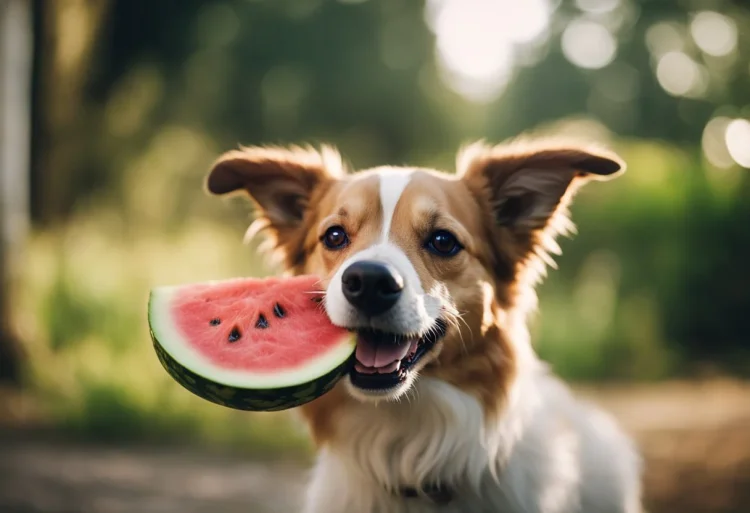: Exploring the Sweet and Juicy Debate: Can Dogs Eat Watermelon?

Watermelon, with its refreshing taste and high water content, is a favorite summer treat for many humans. As pet owners, we often find ourselves wondering whether our furry companions can partake in the joy of this juicy fruit. Can dogs eat watermelon? It’s a common question that deserves careful consideration to ensure our pets’ well-being. Let’s delve into the world of dogs and watermelon, exploring the potential benefits and risks associated with sharing this delicious fruit with our canine friends.
Nutritional Content:
Watermelon, composed mainly of water, is a low-calorie and hydrating fruit. It also contains essential nutrients like vitamins A and C, which are beneficial for a dog’s overall health. Moreover, watermelon provides antioxidants that contribute to the protection of cells from damage.
However, it’s crucial to note that while watermelon offers some nutritional value, it should not replace a balanced and complete dog diet. Dogs have specific dietary requirements, and treats like watermelon should be offered in moderation.
Feeding Guidelines:
Before serving watermelon to your dog, there are a few guidelines to keep in mind:
- Remove Seeds and Rind: Watermelon seeds and rind can pose a choking hazard and may be difficult for your dog to digest. Always remove the seeds and rind before offering watermelon to your furry friend.
- Portion Control: While watermelon is a healthy fruit, moderation is key. Too much of any treat, including watermelon, can lead to digestive upset or weight issues. As a rule of thumb, treats should constitute no more than 10% of your dog’s daily caloric intake.
- Introduce Gradually: If your dog has never had watermelon before, introduce it gradually. Start with small, bite-sized pieces to observe how your dog reacts. Some dogs may be sensitive to new foods, and it’s essential to monitor for any signs of allergies or digestive issues.
Benefits of Watermelon for Dogs:
- Hydration: With its high water content (about 92%), watermelon can be a hydrating and refreshing snack, especially during hot weather. Adequate hydration is crucial for a dog’s overall well-being and helps regulate body temperature.
- Vitamins and Antioxidants: Watermelon contains vitamins A and C, which are essential for maintaining healthy skin, coat, and immune function. The presence of antioxidants in watermelon can contribute to the neutralization of free radicals in the body.
- Low in Calories: For dogs on a diet or those prone to weight gain, watermelon can be a guilt-free treat. It’s low in calories, making it a healthier alternative to some commercial dog treats.
Risks and Considerations:
- Sugar Content: While watermelon is relatively low in natural sugars compared to other fruits, moderation is still crucial. Excessive sugar intake can lead to weight gain, dental issues, and potential blood sugar spikes in dogs.
- Digestive Issues: Introducing new foods into a dog’s diet can sometimes lead to digestive upset. Monitor your dog for signs of diarrhea, vomiting, or other gastrointestinal issues when offering watermelon for the first time.
- Allergies: Just like humans, dogs can have allergies. Watch for any allergic reactions, such as itching, swelling, or difficulty breathing, and consult your veterinarian if you observe such symptoms.
Conclusion:
In conclusion, watermelon can be a safe and enjoyable treat for dogs when offered in moderation and prepared properly. Its hydrating properties, along with the vitamins and antioxidants it provides, can contribute positively to a dog’s overall health. However, responsible pet ownership involves understanding your dog’s individual needs, dietary restrictions, and potential sensitivities.
Before introducing watermelon or any new treat into your dog’s diet, it’s always advisable to consult with your veterinarian. They can provide guidance based on your dog’s specific health conditions, dietary requirements, and any potential risks associated with certain foods. With proper care and attention, you can share the joy of watermelon with your canine companion, making snack time a delightful and healthy experience for both of you.
Q: Can I feed my dog watermelon seeds? A: No, it is not advisable to feed your dog watermelon seeds. Seeds can pose a choking hazard, and the hard outer shell may be challenging for your dog to digest. Always remove seeds before offering watermelon to your furry friend.
2. Q: Is it safe to give my dog watermelon rind? A: No, watermelon rind can be tough to digest and may cause digestive issues in dogs. It is recommended to remove the rind and offer only the flesh of the watermelon in small, bite-sized pieces.
3. Q: How much watermelon can I give to my dog? A: Moderation is key. Treats, including watermelon, should constitute no more than 10% of your dog’s daily caloric intake. Depending on your dog’s size, start with small, appropriately sized portions and observe their reaction.
4. Q: Can watermelon be a substitute for water for my dog? A: While watermelon has high water content and can contribute to your dog’s hydration, it should not replace their regular water intake. Always ensure your dog has access to fresh, clean water, especially during hot weather.
5. Q: Are there any health benefits to feeding my dog watermelon? A: Yes, watermelon can offer hydration, essential vitamins (A and C), and antioxidants. It is a low-calorie treat that can be a healthy alternative to some commercial dog treats when given in moderation.
6. Q: Can diabetic dogs eat watermelon? A: It’s crucial to be cautious with fruits, including watermelon, for diabetic dogs due to their natural sugar content. Consult your veterinarian to determine if watermelon is suitable for your diabetic dog and in what quantities.
7. Q: How should I introduce watermelon to my dog’s diet? A: Introduce watermelon gradually by offering small, bite-sized pieces. Monitor your dog for any signs of allergies or digestive upset. If your dog has not had watermelon before, consult with your veterinarian before incorporating it into their regular diet.
8. Q: Are there any risks associated with feeding dogs watermelon? A: While watermelon is generally safe, it’s essential to be mindful of the sugar content and potential digestive issues. Allergic reactions are possible, so monitor your dog for any adverse effects and seek veterinary advice if needed.
9. Q: Can puppies eat watermelon? A: Puppies can eat watermelon, but it’s crucial to introduce it slowly and in moderation. Puppies have sensitive stomachs, so monitor for any signs of digestive upset and consult your veterinarian if you have concerns.
10. Q: Can I give my dog frozen watermelon? A: Yes, frozen watermelon can be a refreshing and enjoyable treat for dogs, especially during hot weather. Ensure the pieces are appropriately sized to prevent choking, and monitor your dog while they enjoy the frozen treat.






